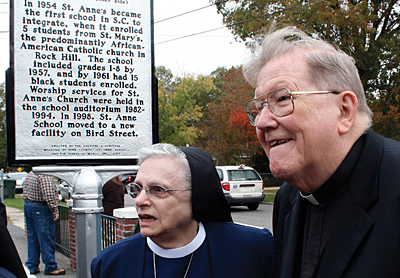
 ROCK HILL—Many people don’t realize that a Catholic school was the first in South Carolina to integrate.
ROCK HILL—Many people don’t realize that a Catholic school was the first in South Carolina to integrate.
In 1954, five African-American students from St. Mary Church enrolled at then St. Anne’s Parochial School.
For nearly a decade, it was the only integrated school in the state.
Now more people will learn about Catholic education’s role in the civil rights history of the state through a new historical marker unveiled Oct. 26 at the school’s former site on Jones Avenue. St. Anne School is now located on Bird Street.
More than 100 people attended the event, including former students, community leaders and public officials, such as Rock Hill Mayor David Echols.
Three sisters from the Servants of the Immaculate Heart of Mary traveled from Pennsylvania to see the unveiling. They taught at St. Anne during the early years of integration, and the order was there from 1958 through the late 1980s.
St. Anne was founded in 1951, and classes were originally held in the church rectory. School officials decided to integrate after the landmark 1954 Supreme Court decision Brown vs. Board of Education, which ruled that segregated public schools were unconstitutional.
The Oratory in Rock Hill has been a supporter of the school from the start, providing instructors, spiritual guidance, and help building the Jones Avenue location when the school outgrew the rectory in 1955.
“We were here to do the best job we could do, trying to do what God would have us do for the good of the children, the parents and the community,” said Oratorian Father William Pentis.
Father Pentis taught at St. Anne and was pastor at the church from 1983 to 2004.
“We were trying to give the children not only the gift of education in the three Rs, but also the knowledge of God’s love,” he said.
He recalled long days of picking children up for school, teaching all day, driving the children home and spending the evening preparing the next day’s lessons.
Oratorian Brother David Boone, who won the Order of the Palmetto in May for his work in civil rights efforts around Rock Hill, remembered driving students to the school and checking in the rearview mirror to make sure nobody was following the station wagon or van.
“I deeply admire those who stood by the decision of integrating St. Anne, knowing the climate was not the best for it at that time,” he said. “It was hard on the parents of those involved because of pressure they got in their neighborhoods and workplace.”
None of the original five black students were able to attend the event. One of them, Msgr. James E. White of Blessed Sacrament Church in Bronx, N.Y., said in a phone interview with The Miscellany that the examples he saw at St. Anne sparked his interest in religious life and the priesthood.
Msgr. White attended St. Anne from second through sixth grade, when his family moved to New York. He remembered a priest from The Oratory who regularly visited his family and shared meals with them, an unusual occurrence in the segregated South.
“Although we knew a bit about what was going on, the impact never really dawned on us,” he said. “There was curiosity about how the mixture of white and black would work out, but you know, as kids there was really no difference to us. We were just being kids.”
Msgr. White said it was only when he got older that he learned about the difficulties many people, black and white, faced in order to make integration at St. Anne a reality. He learned that drivers who brought him to school each day in a van often had to change routes to avoid protesters.
“I think I learned a lesson at St. Anne that I didn’t learn anywhere else at the time, the importance of just getting along with people and having an interest in people,” he said. “We’re all basically the same, and I think the foundations we receive in our early years make us the person we are in the future.”
Sister Marie Magdalena Nicolino taught first and second grades and music at St. Anne.
“It’s really just overwhelming to be here for this,” she said. “When we were here, we just felt we were doing what we thought we should do. We didn’t think we were doing anything that unusual. We just wanted to teach children about love of neighbor and love of God.”
